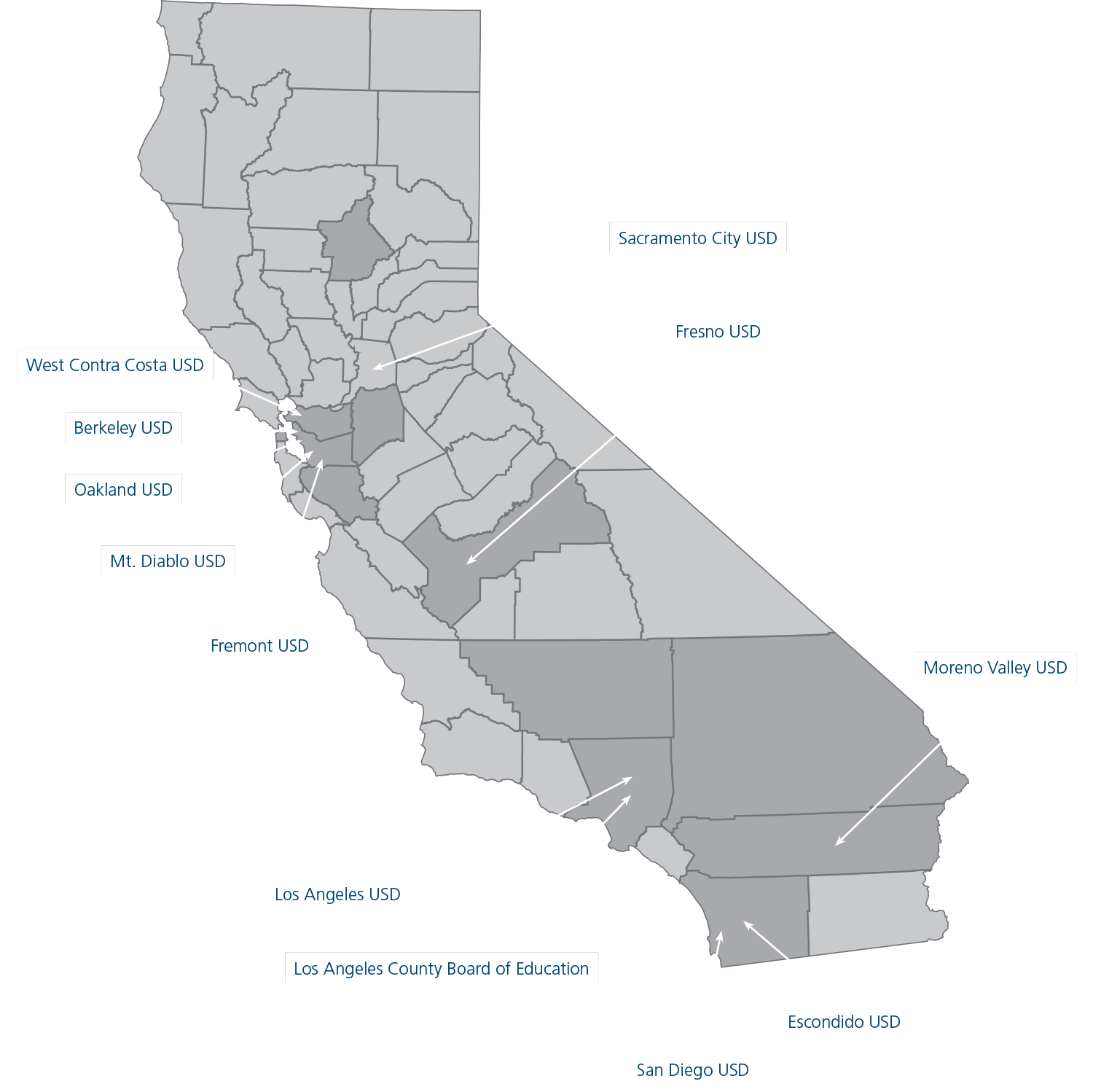Since 1992, CSBA’s Education Legal Alliance (ELA) has been the pre-eminent legal advocate for California’s public schools, initiating litigation and providing amicus support on issues of statewide importance. The ELA has protected billions of dollars in K-12 General Fund revenue and mandate payments owed to schools, and consistently defended the governance role of boards.
This past year, the ELA continued to effectively protect and promote the interests of its member school districts and county offices of education before the courts.
In July, CSBA and the ELA filed a lawsuit against the California State Controller, aiming to capture nearly $1 billion in Proposition 98 funding that was lost due to improper calculation of property taxes owed to school districts from five California counties, pertaining to California’s Educational Revenue Augmentation Fund (ERAF). This improper calculation by the counties results in schools not receiving approximately $283 million in funding for 2019–20, $298 million for 2020–21, and $315.9 million for 2021–22.
Throughout the year, the ELA also filed numerous amicus briefs in support of school district and county board of education governance teams. These cases included Brennon B. v. West Contra Costa Unified School District (protecting LEAs against paying treble damages and attorney’s fees under the misapplication of the Unruh Act); Davis v. Fresno Unified School District (aiming to protect school funding by providing clarity and certainty to LEAs using lease-leaseback contracts); and Coast Community College District v. Commission on State Mandates and San Diego Unified School District v. State of California (recovering and protecting funding owed to LEAs to cover spending mandated by the state).
In addition, while CSBA’s Legal Department continued its ongoing support and guidance to members on a wide range of legal matters, including the complex issues related to the COVID-19 pandemic, governing board meetings and reopening schools, we also launched a new District and County Office of Education Legal Services program to provide direct legal advice and representation to our members.
The ELA will continue to support the interests of public schools and governance teams on issues that have a statewide impact. Thank you for your continued support for the ELA and its ongoing role as the legal defender of California’s public schools.

CEO & Executive Director,
California School Boards Association
![]() Collective bargaining — Privileged communications
Collective bargaining — Privileged communications
![]() Disability-based discrimination — Claims under Unruh Act
Disability-based discrimination — Claims under Unruh Act
![]() Special education — Procedural violations
Special education — Procedural violations
![]() Special education — Attorney’s fees
Special education — Attorney’s fees
![]() Immigration and k-12 education — Revised public charge rule
Immigration and k-12 education — Revised public charge rule
![]() Deferred Action for Childhood Arrivals (daca)
Deferred Action for Childhood Arrivals (daca)
![]() Fair Political Practices Commission regulation
Fair Political Practices Commission regulation
![]() Facility funding — Lease-leaseback contracts
Facility funding — Lease-leaseback contracts

CSBA’s Education Legal Alliance is a consortium of school districts, county offices of education, and Regional Occupational Centers/Programs that voluntarily joined together in 1992 to create a powerful force to pursue and defend a broad spectrum of statewide public education interests before state and federal courts, state agencies, and the Legislature. The ELA initiates and supports legal activities in areas of statewide significance to all California schools. Working with school attorneys, the efforts of the ELA have proven highly effective in protecting the interests of schools and the students they serve. Potential matters are reviewed and approved by a broad-based steering committee of board members, superintendents, and education leaders. There is also a legal advisory committee of noted school law attorneys to help provide legal analysis and recommendations to the steering committee.
The ELA is funded exclusively by contributions from its members, who are also members of CSBA.

Chair, Legal Affairs Committee, California Association of Joint Powers Authorities

CSBA’s Education Legal Alliance is a consortium of school districts, county offices of education, and Regional Occupational Centers/Programs that voluntarily joined together in 1992 to create a powerful force to pursue and defend a broad spectrum of statewide public education interests before state and federal courts, state agencies, and the Legislature. The ELA initiates and supports legal activities in areas of statewide significance to all California schools. Working with school attorneys, the efforts of the ELA have proven highly effective in protecting the interests of schools and the students they serve. Potential matters are reviewed and approved by a broad-based steering committee of board members, superintendents, and education leaders. There is also a legal advisory committee of noted school law attorneys to help provide legal analysis and recommendations to the steering committee.
The ELA is funded exclusively by contributions from its members, who are also members of CSBA.

Chair, Legal Affairs Committee, California
Association of Joint Powers Authorities

- The ELA files amicus briefs and letters in court to support its members on legal issues of statewide importance.
- The ELA initiates litigation on various issues of statewide importance and often looks to its members to serve as co-plaintiffs in those cases.
- The ELA weighs in on legislation that impacts its members on issues of statewide importance.

Committee

CSBA President
Natomas USD

CSBA CEO & Executive Director

CSBA Delegate, Region 24
Whittier Union HSD

Delegate-at-Large, Region 15
Huntington Beach Union HSD

Regional County Delegate, Region 3
Solano COE

County Superintendent
Marin COE

Superintendent
Pacifica SD

Past Superintendent
Palm Springs USD

Superintendent
San Mateo Union HSD

County Superintendent
San Diego COE

Consultant

Committee
Staff

Lozano Smith

Parker & Covert LLP

Dannis Woliver Kelley

Fagen Friedman & Fulfrost LLP

Atkinson, Andelson, Loya,
Ruud & Romo

Orange County
Department of Education

Sacramento County
Office of Education

Chief Legal Counsel

General Counsel &
Chief of Staff

CSBA
Deputy General Counsel

CSBA
Associate General Counsel

CSBA
Senior Legal Services Attorney

CSBA
Paralegal
Committee

Lozano Smith

Parker & Covert LLP

Dannis Woliver Kelley

Fagen Friedman & Fulfrost LLP

Atkinson, Andelson, Loya,
Ruud & Romo

Orange County
Department of Education

Sacramento County
Office of Education
Staff

Chief Legal Counsel

General Counsel &
Chief of Staff

CSBA
Deputy General Counsel

CSBA
Associate General Counsel

CSBA
Senior Legal Services Attorney

CSBA
Paralegal
Activities

MEMBER(S) INVOLVED: Filed on behalf of all California school districts and county offices of education
IMPORTANCE OF STATEWIDE ISSUE:




Disability-Based Discrimination — Claims Under Unruh Act


Special Education — Attorney’s Fees


MEMBER(S) INVOLVED: Filed on behalf of all California school districts and county offices of education

MEMBER(S) INVOLVED: Filed on behalf of all California school districts and county offices of education

MEMBER(S) INVOLVED: Filed on behalf of all California school districts and county offices of education




